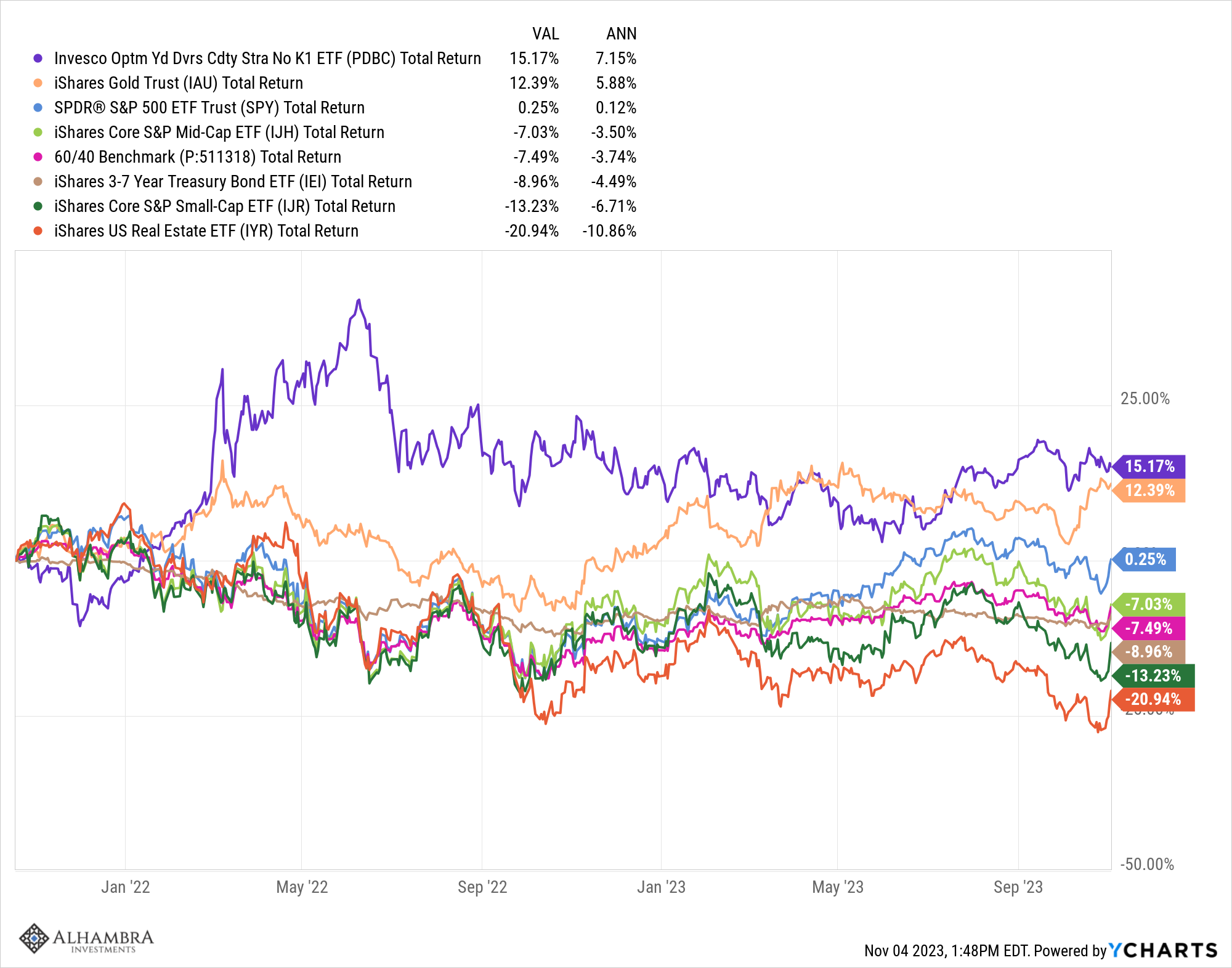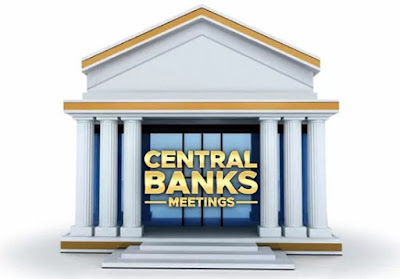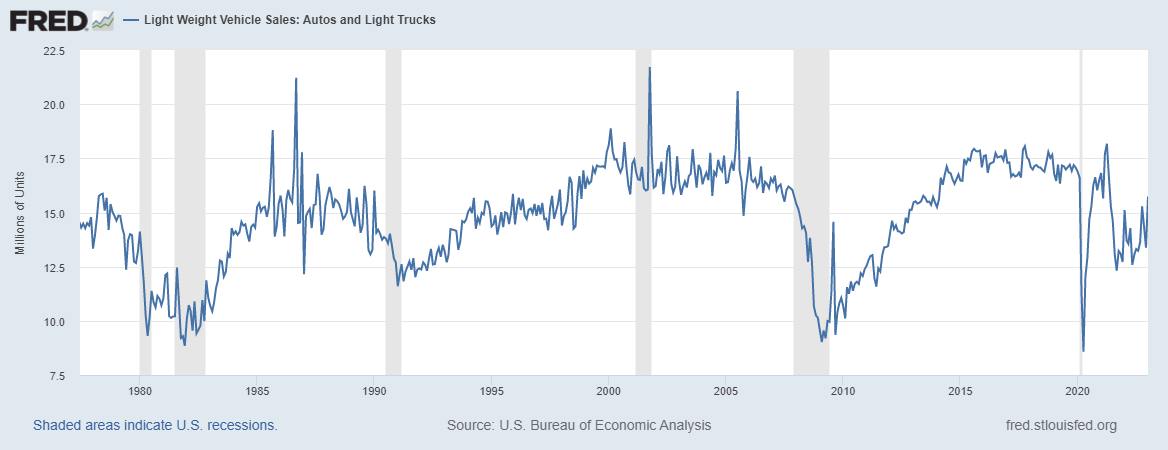Is Stagflation a Potential Threat?The Incrementum Fund held its quarterly advisory board meeting on October 3 (the transcript can be downloaded below). Our regular participants – the two fund managers Ronald Stoeferle and Mark Valek, advisory board members Jim Rickards, Frank Shostak and yours truly – were joined by special guest Grant Williams this time. Many of our readers probably know Grant; he is the author of the bi-monthly newsletter “Things That Make You Go Hmmm…”, as well as one of the founders of Real Vision TV. Characteristics of stagflation: economic growth goes into reverse, but price inflation rises anyway. This scenario was completely unexpected by the Keynesian consensus when it hit the economy in the 1970s. Keynesian theory ended up discredited for a while as a result. Not surprisingly though, as a theory that provides a “scientific” fig leaf for statism and interventionism, it has been resurrected since then. Today it once again is an important part of mainstream economic orthodoxy; the monetarist school has retained a certain degree of influence as well, but its policy prescriptions are just as misguided in our opinion. |
|
| The focus of the discussion was a contrarian topic – namely, the question whether amid widespread fear over an allegedly looming deflation threat, the time might actually be ripe for stagflation to make a comeback.
Although none of the participants expected a particularly strong surge in price inflation in the short term (apart from base effects becoming noticeable in headline inflation numbers in coming months), there are certainly more and more signs that the loose monetary policy of central banks is beginning to succeed in producing at least some price inflation. There can be very large time lags between excessive money supply expansion and rising prices, but in the longer term is seems certainly possible that many currently wide-spread consensus expectations regarding future price inflation and market trends could turn out to be quite wrong. The proprietary Incrementum Inflation Signal definitely indicates that the trend in price inflation remains up: |
The Incrementum Inflation Signal continues to indicate that a period of strengthening price inflation has begun. The inputs used to calculate the signal are all market-based. |
Oil PricesOne of the topics under discussion in this context was the price of oil. It seems possible that market participants are underestimating the potential for crude oil prices to advance further in the long term (from a fundamental perspective, the market is actually much tighter than is widely perceived). It should be noted though that the oil market has to contend with two sizable obstacles that are likely to put pressure on prices in the near term. One is the seasonal trend discussed by Dimitri Speck (see “Crude Oil has Entered a Seasonal Downtrend” for details). The other is the fact that the speculative net long position in crude oil futures has climbed back to a rare extreme, which strongly suggests the need for a shakeout: |
This chart shows the net position of commercial hedgers in WTI crude oil futures, i.e., the inverse of the net speculative position. The current level of 408,000 contracts is one of the highest on record. Even higher readings were only seen in early to mid 2014 – and that certainly didn’t end well for oil longs. |
| In short, it is important to keep time frames in mind. Commodity prices have turned up, and the long term uptrend in nominal commodity prices – including crude oil prices – may well have resumed. However, even if that is the case, short term setbacks should be expected and in the case of crude oil both the seasonal trend and the positioning of speculators suggest that one of those is now underway.
While the potential for a stronger rise in oil prices over the long term was not dismissed, the near term prospects for oil were actually seen as limited by participants, and there was also consensus on the inability of OPEC to influence prices. Frank Shostak continues to expect a significant decline in oil prices next year based on his econometric model. |
A decline in oil prices has begun right in line with the seasonal trend (which is pointing down between mid October and mid February); given the extremely large speculative net long position, there is potential for this correction to become quite sizable. |
European BanksAnother topic was Deutsche Bank and the European banking industry in general. At the time of the meeting, the share price of DB had just declined to a multi-decade low and credit default swaps on its senior unsecured debt were in a noticeable uptrend (in which they incidentally remain). The troubles of Italy’s banking industry are well known, and the question is whether the European Bank Recovery and Resolution Directive (BRRD) will be strictly enforced if push comes to shove. This obviously entails considerable economic and political risks. One conclusion was that while European decision-makers were likely to want to avoid a “Lehman moment”, they may well get one anyway. With respect to DB, we want to highlight one remark of Jim Rickards in particular: as he noted, there has been a rapid reduction in the notional value of Deutsche’s derivatives book, which could be a sign that counterparties are either not renewing expiring contracts or are trying to get out of existing ones. At the moment things have obviously quieted down a bit again, but we would contend that the basic problems have not gone away. |
Complacent Bond Markets
The point remains though that rising oil prices and a surge in price inflation are currently quite far from the radar screens of the majority of investors and economists.
In particular, bond market participants have become extremely complacent. The idea that central banks will always be able to manipulate yields lower has become deeply ingrained. Negative yields-to-maturity are no longer recognized for the absurdity they actually are.
This idea is essentially a textbook example of bubble rationalization. Central banks do of course influence prices with their policies, but the notion that they have certain markets “under control” couldn’t be more wrong.
Anyone familiar with financial markets should be aware of this. Simply put, if central banks could actually “control” markets, there would never be any crashes or bear markets. Nothing terrifies the bureaucrats more than “volatility” (code-word for rapidly falling asset prices).

US Elections
Readers should keep in mind that the conference call took place before the infamous video of Trump’s “locker room talk” surfaced and a number of women came forward to accuse him of improper behavior. While we deem these accusations not particularly credible for a variety of reasons (best articulated by Stefan Molyneux here), it seems clear that this development has harmed his election chances.
Nevertheless, the observations we have made regarding the unreliability of polls in this election remain applicable (mainly due to oversampling of Clinton supporters and the “Bradley effect”). Several participants agreed that Trump’s chances to win the election were underestimated. This very likely remains the case, even if recent events have diminished his chances somewhat.
One must keep in mind in this context that the den of corruption administered by the Clintons is a gift that keeps on giving, mainly in the form of emails published by Wikileaks and others. Collections of questionable emails which the FBI keeps bumping into have recently re-entered the mix as well, with thousands of previously “lost” emails found in a most surprising place (an alleged pedophile serial exhibitionist appears to have a bunch of them stored on his laptop).
Market Outlook
At the end of the meeting, participants as usual discussed their market outlook and investment ideas for the coming months. The markets haven’t really moved a whole lot since then, so these ideas and forecasts are not overly dated yet and may still serve as an inspiration.
One regret is that we didn’t get Jim Rickards’ recommendation of AMZN as a potential short candidate out earlier, as the stock was recently hit quite hard after announcing disappointing earnings.
Download Link:
The transcript of the meeting can be downloaded here: Incrementum / AEGO Advisory Board Meeting (PDF). Enjoy!
Charts by: Incrementum, StockCharts, SentimenTrader.
Full story here Are you the author? Previous post See more for Next post
Tags: central-banks,commodities,Credit Markets,Crude Oil,Donald Trump,Jim Rickards,newslettersent,On Economy,Precious Metals,The Stock Market










































